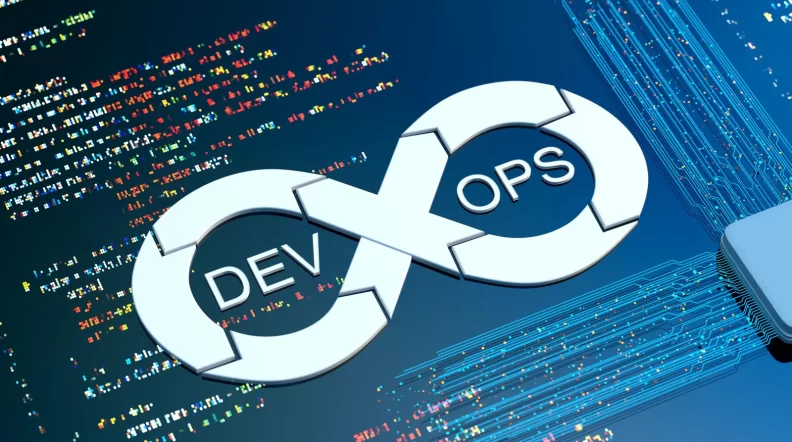Best Programming Language for DevOps: A Comprehensive Guide






DevOps stands at the crossroads of software development and operations, streamlining and automating processes to improve efficiency and deployment speed. The choice of programming language is pivotal in this journey, impacting everything from automation capabilities to system integration. This guide aims to navigate through the complexities of selecting the ideal programming language for DevOps, taking into account various criteria such as compatibility, performance, and security.
With the evolution of DevOps, the role of programming languages has become increasingly significant. The right language not only facilitates collaboration among teams but also enhances the scope of continuous improvement. Whether you’re automating repetitive tasks, managing infrastructure, or developing new applications, understanding the strengths and limitations of each language is crucial.
This comprehensive guide will explore various programming languages, focusing on their relevance and applicability in the DevOps realm. From the versatility of Python to the robustness of Java, and the concurrency support in Go, we’ll delve into what makes these languages suitable for DevOps operations and how they contribute to streamlining software delivery.
Introduction to DevOps and Its Importance in Programming
DevOps merges software development and IT operations, aiming to shorten the system development life cycle while delivering features, fixes, and updates frequently in close alignment with business objectives. This methodology emphasizes the importance of communication, collaboration, integration, and automation to improve workflow between software developers and IT professionals.
The introduction of DevOps has revolutionized programming, making it more dynamic and responsive to the changing market demands. By fostering a culture of continuous improvement, DevOps facilitates a more efficient and reliable software development process, making programming languages an essential tool in this innovative approach.
Defining the Role of DevOps in Modern Software Development
DevOps plays a crucial role in modern software development by bridging the gap between development and operations teams. This approach ensures that software can be developed, tested, and released faster and more reliably. The use of shell scripting and other automation techniques allows DevOps teams to execute complex deployments and infrastructure management with ease and precision.
Furthermore, DevOps encourages a culture of continuous feedback and iterative improvement, enabling teams to adapt to changes quickly. This agility is vital in today’s fast-paced digital landscape, where customer expectations and market conditions can shift rapidly. By integrating development and operations, DevOps enhances both the efficiency of the development process and the reliability of the software produced.
The Evolution of DevOps: Past, Present, and Future
The concept of DevOps has evolved from a niche approach to a mainstream practice embraced by organizations worldwide. Initially, the focus was on improving collaboration between software development and IT operations teams to enhance software delivery speed and quality. Over time, the adoption of various programming and scripting languages has played a significant role in this evolution, enabling more sophisticated automation and integration capabilities.
Today, languages like Python, known for its clean syntax and dynamic typing, and Java, a high-level programming language that is highly scalable, are among the preferred choices for DevOps teams. Looking ahead, the future of DevOps will likely be shaped by emerging technologies like artificial intelligence and machine learning, driving the need for programming languages that can support more complex, data-driven automation and decision-making processes.
Evaluating the Best Programming Languages for DevOps
Selecting the right programming language for DevOps involves considering various factors, including the language’s compatibility with existing systems, its performance and scalability, and the security features it offers. This section will delve into these criteria, offering insights into how different languages measure up in the context of DevOps practices.
Criteria for Selecting the Right Programming Language
Integration & Compatibility
Integration and compatibility are key considerations when choosing a programming language for DevOps. The language must seamlessly integrate with various DevOps tools and operating systems to facilitate a smooth workflow. Moreover, it should support DevOps automation, enabling teams to automate repetitive tasks efficiently and effectively.
This compatibility extends to the integration with cloud services, containerization tools, and continuous integration/continuous deployment (CI/CD) pipelines. A language that offers broad support for these elements can significantly enhance a DevOps team’s productivity and efficiency, making it a critical factor in the selection process.
Scalability and Performance
Scalability and performance are critical attributes of a programming language in a DevOps environment. The language must be capable of handling large-scale applications and computationally intensive tasks without compromising on speed or efficiency. This ensures that as the system grows, the development and operations processes remain streamlined and effective.
Languages that offer high performance and scalability can support faster development cycles and more reliable deployments. This not only improves the overall software delivery process but also enhances the end-user experience by ensuring that applications are responsive and available when needed.
Security Considerations
Security is a paramount concern in DevOps, requiring programming languages to have robust security features and practices. The language should facilitate the development of secure code and support the implementation of security measures throughout the software development lifecycle. This includes everything from secure coding practices to vulnerability detection and remediation.
Moreover, the language should be regularly updated to address new security threats and vulnerabilities. A strong community and ongoing support can contribute significantly to the security of a programming language, making it a safer choice for DevOps practices.
Community Support and Maturity
The community support and maturity of a programming language are vital factors in its suitability for DevOps. A well-established language with a large and active community can offer extensive resources, including libraries, frameworks, and tools, that facilitate application development and automation tasks. Additionally, community support can be invaluable for troubleshooting and learning best practices.
The maturity of a language also indicates its stability and reliability, which are crucial for the continuous integration and deployment processes central to DevOps. A mature language with broad support and powerful libraries can greatly enhance the efficiency and effectiveness of DevOps practices.
Top Programming & Scripting Languages for DevOps Engineers
1. Python: The Swiss Army Knife for DevOps
Python stands out as a premier choice for DevOps due to its clean syntax, dynamic typing, and broad support for libraries and frameworks. These features make it accessible to beginners and advanced programmers alike, allowing for rapid development and deployment of applications. Python’s versatility makes it suitable for a wide range of tasks in DevOps, from web development to data analysis.
Furthermore, Python’s strong integration capabilities with other technologies and its ability to adapt to various environments and use cases make it an attractive option for DevOps teams. Whether automating tasks, managing infrastructure, or developing new tools, Python’s flexibility and power support DevOps practices effectively.
2. Java: Building Robust and Scalable Systems
Java, a high-level programming language known for its portability, scalability, and robustness, is highly favored in DevOps for developing large-scale applications. Its object-oriented design facilitates modular programming and reusable code, enhancing the efficiency of development processes. Java’s wide range of frameworks and tools supports continuous integration and deployment, making it a strong candidate for DevOps environments.
Additionally, Java’s strong community support and rich ecosystem of libraries and tools provide DevOps teams with extensive resources to streamline their workflows. Its ability to run on any device or platform that supports the Java Virtual Machine (JVM) adds to its flexibility, making Java a versatile choice for DevOps projects.
3. JavaScript: For Seamless Front-end and Back-end Development
JavaScript, with its capabilities for both client-side scripting and server-side development, offers a unified programming language for full-stack development. This versatility allows DevOps teams to use a single language across the entire development stack, simplifying the process and improving efficiency. JavaScript’s rich ecosystem, including Node.js for server-side programming, enables the development of scalable and high-performance web applications.
Moreover, JavaScript’s dynamic nature and support for event-driven programming make it well-suited for developing responsive web interfaces and real-time applications. Its widespread use and strong community support further contribute to its appeal as a DevOps language, offering a wealth of libraries, frameworks, and tools to accelerate development and deployment processes.
4. Go (Golang): Concurrent Tasks Made Easy
Go, or Golang, developed by Google, is a statically typed, compiled language known for its simplicity, efficiency, and strong support for concurrency. These features make Go an excellent choice for DevOps, particularly for developing high-performance, scalable server-side applications and distributed systems. Its efficient compilation and execution, along with its straightforward syntax, allow for rapid development and deployment.
Go’s built-in support for concurrent programming models enables DevOps teams to build applications that can handle multiple tasks simultaneously, improving performance and responsiveness. Its growing ecosystem and the backing of Google ensure continuous improvement and a robust set of tools for DevOps engineers, making Go a compelling option for modern software development and operations.
5. Ruby: Quick and Efficient Scripting
Ruby, known for its simplicity and productivity, has carved a niche in the DevOps landscape due to its powerful scripting capabilities. It enables developers to build and manage applications more efficiently, with a syntax that is both easy to write and read. This has made Ruby particularly popular for writing build scripts, automation tasks, and managing infrastructure as code, enhancing the speed and agility of DevOps practices.
Moreover, the wide range of available gems (libraries) in Ruby’s ecosystem allows for rapid development and integration of new features or tools into projects. This, combined with Ruby’s strong web framework, Ruby on Rails, makes it an invaluable asset for creating and managing web applications within a DevOps framework. The community support and mature libraries further ease the process of troubleshooting and adopting new methodologies, making Ruby a go-to language for many DevOps engineers.
6. Perl: Text Processing and System Management
Perl has long been esteemed for its prowess in text processing and system management tasks, making it an enduring choice for DevOps engineers. Its ability to handle complex data parsing and manipulation tasks with ease stems from its rich set of built-in functionalities and third-party modules. This makes Perl particularly suited for automating system administration tasks, log file analysis, and processing large volumes of data, which are common needs in DevOps environments.
Despite newer languages gaining popularity, Perl’s unparalleled text processing capabilities, combined with its strong support for network programming and system administration, continue to make it indispensable for certain DevOps workflows. Its comprehensive CPAN repository further provides a vast array of modules for various automation and integration tasks, enabling DevOps teams to implement rapid and effective solutions for complex problems.
7. PHP: Dynamic Web Content Handling
PHP, widely recognized for its role in web development, also offers significant benefits to DevOps practices, especially in environments focused on dynamic web content. Its ability to seamlessly integrate with various databases and web servers makes it an excellent choice for developing and deploying web applications swiftly. This aligns well with the DevOps goal of accelerating deployment cycles and enhancing collaboration between development and operations teams.
Furthermore, the extensive array of frameworks and tools available in the PHP ecosystem facilitates the automation of deployment processes and infrastructure management, contributing to more efficient DevOps workflows. The ease of learning PHP and its widespread use also means there is a large community available for support, making it easier to find solutions and best practices for DevOps challenges involving dynamic web content.
Deep Dive into DevOps-Friendly Programming Languages
The landscape of DevOps-friendly programming languages is diverse, each offering unique advantages that cater to different aspects of DevOps workflows. This section delves into the specifics of how these languages facilitate DevOps practices, focusing on their integration capabilities, performance, and support for automation. Understanding these nuances is crucial for selecting the most suitable language for a given DevOps project.
Python in DevOps: A Closer Look
Python stands out in the DevOps community for its versatility and ease of use. Its extensive standard library and wide range of third-party modules make it an excellent tool for scripting, automation, and infrastructure as code (IaC). Python’s readability and simplicity allow DevOps engineers to quickly write scripts that enhance productivity and operational efficiency.
Integration with DevOps Tools
Python’s ability to integrate seamlessly with a multitude of DevOps tools is one of its key strengths. Whether it’s configuration management tools like Ansible, container orchestration systems like Kubernetes, or continuous integration/continuous deployment (CI/CD) pipelines, Python’s compatibility enhances its utility. This ease of integration streamlines the development process, enabling a more cohesive and automated workflow.
Additionally, Python’s extensive APIs and libraries facilitate smooth interaction with cloud services, virtual machines, and various automation frameworks. This interoperability is crucial for creating flexible and scalable DevOps solutions that can adapt to the evolving needs of modern software development projects.
Python Frameworks and Libraries for Automation
Python’s rich ecosystem of frameworks and libraries is a boon for DevOps automation. Libraries like Fabric for remote execution and deployment, or Ansible for configuration management, exemplify Python’s capabilities in automating routine development and deployment tasks. These tools help in simplifying complex processes, reducing the potential for human error, and speeding up the CI/CD pipeline.
Frameworks such as Django and Flask, while primarily used for web development, also support DevOps practices by streamlining the deployment process and integrating with tools for monitoring and management. The robustness of these frameworks, combined with Python’s scripting flexibility, make it a powerhouse for developing automated solutions in DevOps environments.
Golang vs Java: Choosing for High Performance
When high performance is a critical requirement, the decision between Golang and Java can be challenging. Both languages offer compelling features for DevOps, such as efficient concurrency models and strong community support. This comparison sheds light on their respective strengths and suitability for high-performance DevOps applications.
Benchmarks in Speed and Efficiency
Golang, with its lean syntax and powerful standard library, is known for its exceptional speed and efficiency, especially in concurrent tasks and microservices architectures. Its compiled nature and simplicity result in fast execution times and lower resource consumption, which are crucial for scalable applications in DevOps environments.
Java, on the other hand, boasts robustness and a vast ecosystem of tools and libraries that can enhance development efficiency. While Java applications might not match Golang’s raw speed, the Java Virtual Machine (JVM) optimizes execution through just-in-time (JIT) compilation, making Java a competitive option for high-performance DevOps projects.
Use Cases in DevOps Projects
Golang’s speed and simplicity make it ideal for creating lightweight microservices, CLI tools for DevOps tasks, and infrastructure automation. Its ability to handle multiple tasks concurrently is particularly beneficial for high-throughput, scalable applications. The compiled binaries are also easily deployable across different environments, simplifying the CI/CD pipeline.
Java’s extensive library ecosystem and mature frameworks, on the other hand, support complex application development, making it suitable for enterprise-level systems with high demands on reliability and scalability. Java’s widespread use in cloud-based services further underscores its relevance in DevOps, offering solutions for a broad range of project requirements.
FAQs on DevOps Programming and Scripting Languages
Navigating the choice of programming and scripting languages for DevOps can be daunting. This section addresses frequently asked questions, providing clarity on the differences between programming and scripting languages, the time it takes to master them, their roles in DevOps, and the balance between coding and collaboration in DevOps practices.
Understanding the Difference Between Programming and Scripting Languages
Programming and scripting languages both play vital roles in software development, but they serve different purposes. Programming languages are used to create complex software systems, requiring compilation before execution. They offer more control over hardware and are typically used for developing applications from the ground up.
Scripting languages, however, are interpreted and not compiled, making them more suitable for automating specific tasks within a larger system. They are often used for writing short codes to automate repetitive tasks, manage configurations, or manipulate data. In DevOps, scripting languages are invaluable for their ability to quickly adapt and modify processes.
How Long to Master a DevOps Programming Language?
The journey to mastering a DevOps programming language varies significantly depending on the individual’s background, the specific language, and the complexity of its use cases. For someone with prior programming experience, learning a new language for DevOps tasks might take a few months to become proficient. However, achieving mastery, particularly in applying the language to complex DevOps workflows, can take years.
It’s important to focus not just on the syntax of the language but also on understanding its ecosystem, best practices, and how it integrates with various DevOps tools and platforms. Continuous learning and practical application are key to deepening one’s expertise and staying current with evolving DevOps practices.
The Role of Scripting Languages for DevOps Engineers
Scripting languages are indispensable to DevOps engineers for automating and streamlining software development and deployment processes. They enable quick adjustments to infrastructure, facilitate the scripting of complex deployment workflows, and allow for the automation of testing and integration tasks. This agility is essential for maintaining the high velocity of changes in DevOps environments.
Moreover, scripting languages are often easier to learn and use for immediate tasks compared to full-fledged programming languages, making them accessible tools for solving problems on the fly. They bridge the gap between code development and operational tasks, fostering a culture of cross-functional collaboration that is central to DevOps.
Is DevOps More About Coding or Collaboration?
While coding is an essential skill in DevOps for automating processes and creating efficient workflows, collaboration is equally crucial. DevOps emphasizes the breaking down of silos between development and operations teams, encouraging continuous communication, integration, and mutual support. This collaborative culture is key to achieving the rapid cycles of development, testing, and deployment that define DevOps.
Therefore, while technical skills in coding and system management are fundamental, the ability to work effectively in a team, share knowledge, and adapt to feedback is what truly enables the success of DevOps practices. Balancing these aspects is essential for fostering an environment that supports continuous improvement and innovation.
Navigating the Future of DevOps
The future of DevOps is poised for dynamic shifts, with emerging technologies and methodologies shaping its trajectory. As businesses continue to prioritize deploying applications efficiently and managing infrastructure effectively, the landscape of DevOps is set to evolve. This evolution will likely encompass advances in automation, the integration of artificial intelligence, and the adoption of more sophisticated infrastructure as code practices, ensuring that DevOps remains at the forefront of technological innovation.
Furthermore, the emphasis on security and scalability within DevOps projects is expected to intensify. The integration of structured query language databases and other secure data handling techniques will become more prevalent, enhancing the security posture of DevOps practices. As the demand for DevOps expertise continues to grow, professionals within this field must stay abreast of these changes, adapting to the emerging trends and technologies to maintain their relevance and effectiveness in the marketplace.
Emerging Programming Languages to Watch
In the rapidly evolving world of DevOps, staying informed about emerging programming languages is crucial. Languages that facilitate easy integration, robust security measures, and efficient management of infrastructure are gaining traction. These languages promise to simplify the complexities associated with deploying applications and managing large-scale systems, making them valuable assets for any DevOps engineer. As these new languages mature, they offer the potential to revolutionize how DevOps tasks are approached, providing more streamlined and effective solutions for common challenges.
Among the languages to watch are those that emphasize concurrency, cloud-native capabilities, and microservices architecture compatibility. These languages are designed to improve performance and scalability in DevOps environments, making them well-suited for modern software development demands. As they continue to develop, these programming languages will likely become integral tools for DevOps professionals seeking to enhance their project efficiency and effectiveness.
The Role of AI and Machine Learning in DevOps
The integration of AI and machine learning into DevOps marks a significant transformation in how development and operations tasks are executed. These technologies offer unprecedented capabilities in automating repetitive tasks, predicting potential issues before they arise, and optimizing processes for increased efficiency. For example, AI-driven analytics can facilitate more informed decision-making, while machine learning algorithms can predict system failures, allowing teams to proactively address them.
Moreover, the role of AI and machine learning in enhancing infrastructure as code practices cannot be overstated. By automating the setup and management of infrastructure, these technologies can significantly reduce manual effort and error rates. This not only boosts productivity but also enables DevOps teams to focus on more strategic tasks. As AI and machine learning technologies continue to advance, their impact on DevOps is expected to deepen, ushering in a new era of efficiency and innovation.
Concluding Thoughts: Crafting Your DevOps Journey
The journey into DevOps is both challenging and rewarding, demanding a blend of technical skills, continuous learning, and adaptability. Selecting the right programming language for your DevOps career is a critical decision that influences your ability to contribute effectively to DevOps projects. It requires a thorough understanding of your project’s needs, including factors like scalability, security, and the ease of deploying applications. As the DevOps landscape evolves, so too must the skills and tools of DevOps professionals.
Embracing the principles of infrastructure as code, mastering a structured query language for database management, and staying informed about emerging technologies are all essential for success in DevOps. The journey is ongoing, with each step offering opportunities for growth and innovation. As such, DevOps professionals must remain committed to continuous learning, adapting to new trends, and exploring new tools and technologies to stay ahead in their field.
Selecting the Best Programming Language for Your DevOps Career
When embarking on a DevOps career, the choice of programming language is a pivotal one. It influences how effectively one can manage infrastructure, automate tasks, and contribute to the overall efficiency of DevOps projects. Languages like Python, with its vast ecosystem of libraries and frameworks, offer versatility and ease of learning, making it an excellent choice for many DevOps tasks. On the other hand, languages such as Go and Ruby may be preferred for their performance and specific use cases in automation and web development, respectively.
Ultimately, the best programming language for a DevOps career depends on the specific needs of the projects you’ll be working on and your personal preferences. Factors such as the language’s ability to handle deploying applications, its compatibility with existing tools, and the support available from the community should all be considered. By assessing these criteria, DevOps professionals can make informed decisions that align with their career goals and the technological demands of the DevOps field.
Continuous Learning and Adaptation: The Keys to Success in DevOps
The field of DevOps is characterized by rapid change and the continuous introduction of new tools and practices. To thrive, DevOps professionals must embrace continuous learning, staying up-to-date with the latest best practices, DevOps programming languages, and technologies. Engaging in ongoing DevOps training and gaining proficiency in a wide range of tools, from configuration management tools to container orchestration platforms, is essential. This commitment to learning ensures that DevOps engineers can adapt to new challenges, optimize application deployment processes, and contribute effectively to their teams.
Moreover, the DevOps landscape continues to grow, incorporating new methodologies and technologies that enhance collaboration and efficiency. Keeping abreast of these changes, experimenting with new tools, and applying best practices in real-world scenarios are all critical for personal and professional growth. In doing so, DevOps professionals not only enhance their own skill sets but also drive the evolution of DevOps practices, ensuring the continued success and relevance of the discipline in the face of technological advancements.